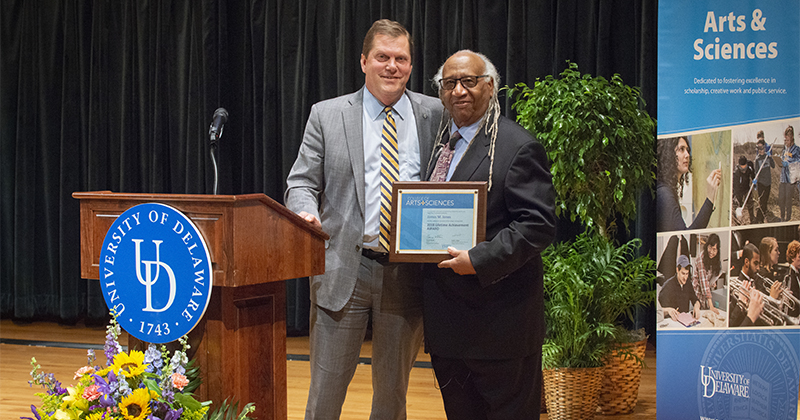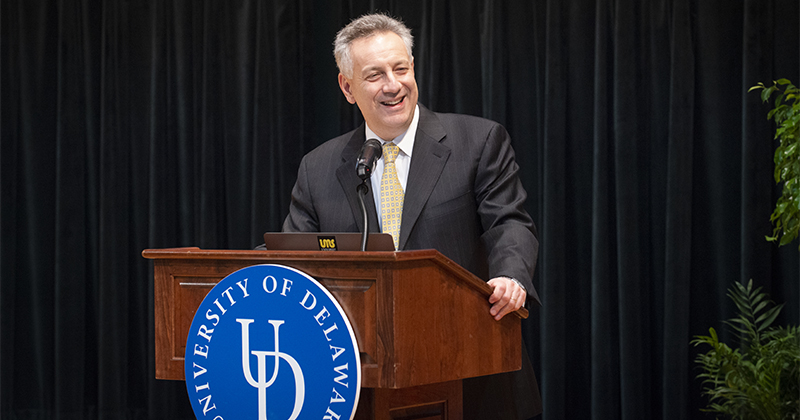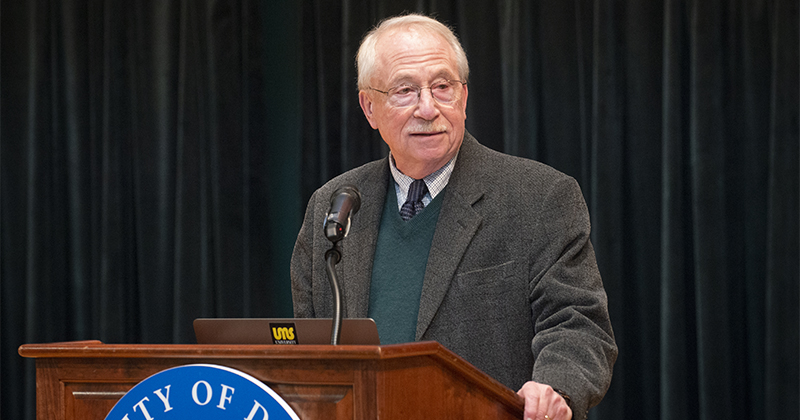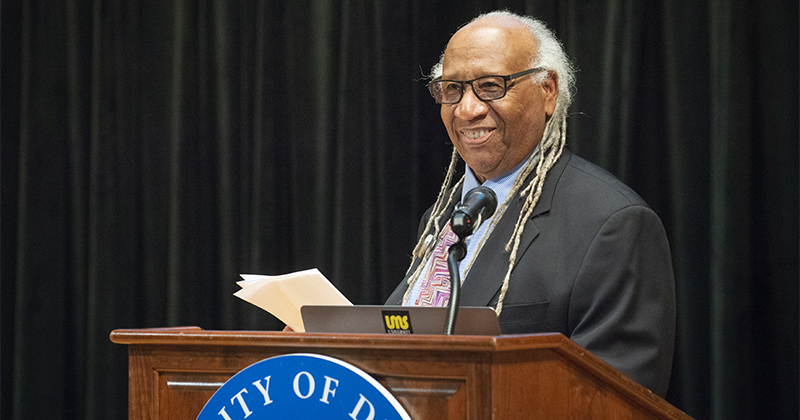

A change agent and a scholar
Photos by Wenbo Fan April 19, 2018
James Jones reflects on his personal, intellectual journey
More than a half-century ago, James M. Jones arrived at Yale University as its first African American graduate student in psychology.
On Monday, April 16, he gave a retirement lecture at the University of Delaware, sharing highlights of a remarkable personal and intellectual journey that began that day in 1966 and has led to international recognition for his work as a social psychologist in the field of prejudice, racism and diversity.
Jones, Trustees' Distinguished Professor Emeritus of Psychological and Brain Sciences and Africana Studies and director of UD’s Center for the Study of Diversity, spoke in Gore Recital Hall of the Roselle Center for the Arts.
Before a large assembly of colleagues and students—past and present—family, friends and professional admirers, he delivered what he told the audience would be “more like a meditation” than a formal lecture.
In the talk, titled “Why and How Diversity Matters: A Personal and Intellectual Journey,” Jones shared some thoughts on the personal and family foundations that helped shape his life, the intellectual ideas that inspired his academic interests, the activities during his career in which he worked to be a catalyst for change, and the importance of understanding issues of race, diversity, equity and inclusion.
“My life and my personal beliefs have informed all my scholarship,” he said.
Showing the audience an image of historian John Hope Franklin’s book From Slavery to Freedom, Jones said the title described his own family’s story. His grandfather was enslaved until the Emancipation Proclamation took effect, then went on to become a minister and to see his six children, including Jones’ mother all graduate from college.
And, with an ancestry that included African, American Indian and white forebears, he said his family’s story is also one of diversity. He spoke about the “duality” that has framed his life—oppression and opportunity, racism and resilience.
Today, Jones said, prejudice and racism continue to be an institutional part of society. While some saw the election of Barack Obama to the presidency as a sign that racism had ended in America, in reality the election “unleashed racism,” Jones said.
He described research showing how institutions and individuals internalize cultural views of race, leading to prejudice that is embedded in society even beyond a person’s conscious awareness.
“I do not believe racism will ever disappear,” Jones said. “It is woven into our culture and our psyche. … Our challenge is to resist it.”
But, he said, he remains an optimist because throughout his career he discovered that ideas can change institutions, and his own work often reflected that.
“I never saw myself as an agent of change,” he said. “I just followed my instincts.”
In many of his professional accomplishments, however, Jones did serve as a change agent and an effective advocate for inclusion and diversity. Among those many roles were his service as executive director for public interest and long-time director of the Minority Fellowship Program at the American Psychological Association.
At UD, Jones is the former director of what was then the Black American Studies program and helped stabilize and strengthen it into today’s Department of Africana Studies.
Accolades and tributes
Jones’ lecture was part of an event celebrating his career and his recent retirement.
In welcoming the audience, UD President Dennis Assanis noted Jones’ “deep appreciation of art and culture, his interest in always learning new things and his eagerness to explore the world through other people.”
He said Jones, “with the curiosity of a lifelong student,” has examined some of society’s most important challenges about the psychology of race.
“James used the tools of science to illuminate the underlying complexity of how we see and think about the world and each other,” Assanis said. “And through his work, he showed us that we can build a better world for everyone.”
Jones was formally introduced to the audience by longtime colleague Sam Gaertner, also Trustees Distinguished Professor Emeritus of Psychological and Brain Sciences, who retired in 2016. The two social psychologists shared a research focus on prejudice, discrimination and racism.
Calling Jones “a renowned scholar,” Gaertner cited Jones’ 1972 book, Prejudice and Racism, which he said is a classic in the field, and his recent research that focuses on developing a model to examine how a person develops “diversity competence.”
After the lecture, George Watson, dean of the College of Arts and Sciences, which hosted the event, thanked Jones for sharing his personal stories and professional commentary on diversity.
Gaertner had previously noted that Jones held nine lifetime achievement awards from a variety of organizations, and now, Watson said, he wanted to “bring that number to a nice, round 10.”
He presented Jones the College of Arts and Sciences Lifetime Achievement Award for his career of scholarship, teaching, mentoring and service to the field of psychology and the professional development of others.
“Today, we celebrate the culmination of your career and profound impact on the profession, community and society,” Watson said.
More about James Jones’ career
Jones earned his doctorate at Yale University and has taught at Harvard and Howard universities.
He published the first edition of Prejudice and Racism in 1972 and the second edition in 1997. His most recent book, The Psychology of Diversity: Beyond Prejudice and Racism, with Jack Dovidio and Deborah Vietze, was published in 2014.
His numerous awards include the 1999 Lifetime Achievement Award of the Society for the Psychological Study of Ethnicity, Culture and Race; the 2001 Kurt Lewin Award and the 2009 Distinguished Service Award by the Society for the Psychological Study of Social Issues; the 2007 Distinguished Psychologist Award by the Association of Black Psychologists; the 2011 Lifetime Contribution to Psychology award from the American Psychological Association; the 2018 Gold Medal Award for Life Achievement in Psychology in the Public Interest; and, most recently, the 2018 Morton Deutsch Award for Distinguished Contributions to Social Justice from the International Center for Cooperation and Conflict Resolution at Columbia Teachers College.
Contact Us
Have a UDaily story idea?
Contact us at ocm@udel.edu
Members of the press
Contact us at 302-831-NEWS or visit the Media Relations website





